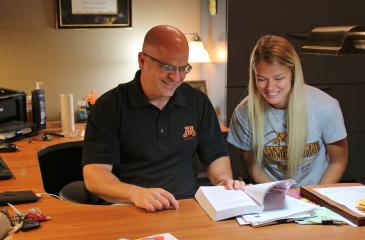Beginning a research career is a daunting endeavor, riddled with challenges that are virtually impossible to navigate alone.
CTSI programs pair each student, trainee, and junior faculty scholar across its six research career development programs with an experienced University of Minnesota faculty investigator. These partnerships ensure support in the complex process of beginning research careers.
“Our mentorship approach enables budding researchers to build multidisciplinary relationships with accomplished investigators who are invested in their success and can guide them along the way,” explains David Ingbar, MD, who directs CTSI’s Research Education, Training, and Career Development core (CTSI-Ed).
These research career mentor-mentee partnerships have benefited nearly 200 students, trainees, and junior faculty across all six schools and colleges in the University of Minnesota’s Academic Health Center, and beyond.
Making the leap from bench to bedside
Take Alexa Pragman, MD, PhD, for example. In 2010, Dr. Pragman was a University fellow who sought to translate her lab-based infectious disease work to the clinical setting.
While an accomplished researcher, Dr. Pragman knew she would face challenges pursuing her research, which aims to help people with lung disease. She wasn’t a pulmonologist, plus she lacked clinical and translational research experience — both factors that would make it difficult to secure the necessary grant funding for her research interests.
To combat these challenges, Dr. Pragman successfully competed for a CTSI Translational Research Development Program (TRDP) award, and enlisted Christine Wendt, MD, to be her mentor.
As a pulmonologist who conducts translational research, Dr. Wendt could assist Dr. Pragman in developing the scientific and research skills she’d need to become an independently funded translational research investigator. In addition, Dr. Wendt provided guidance on how to navigate the career advancement process, submit winning grants, and attain national recognition.
“My mentor makes it her mission to see me succeed, and supports me every step of the way,” says Dr. Pragman.
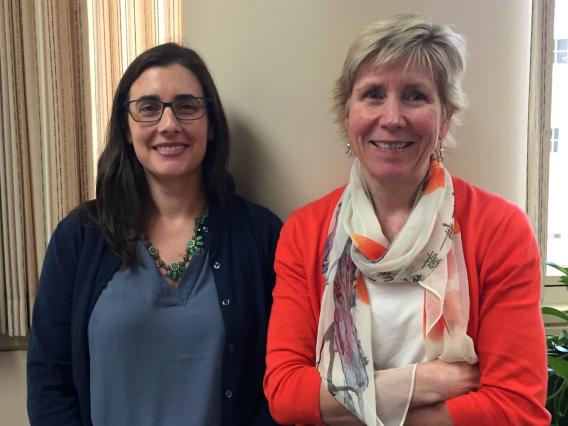
Forming a mentorship team
Dr. Wendt also connected Dr. Pragman with individuals who could provide biostatistical, bioinformatics, and clinical study design expertise and recommend advanced training opportunities. All would become mentors to Dr. Pragman for her TRDP project and collaborators on future projects.
In addition to mentorship, the CTSI TRDP program – as with all CTSI career development programs – provides training, education, and support so scholars can pursue their own research projects. This was Dr. Pragman’s first opportunity to be a PI, and she credits the program for being the “foot in the door” for grant funding that would help her research career take off.
Launching an independent research career
Dr. Pragman leveraged the experience and guidance to apply for and successfully join CTSI’s more advanced KL2 Scholars Career Development Program.
In her first KL2 year, she submitted VA Career Development Program and national American Lung Association research grants, and received both major grant awards.
She would later become among the first – if not the first – to describe the microbiome in the lungs of individuals with chronic obstructive pulmonary disease (COPD), the third leading cause of death in the U.S. “Dr. Pragman conducted a landmark study for her and for her field of study,” explains Dr. Wendt.
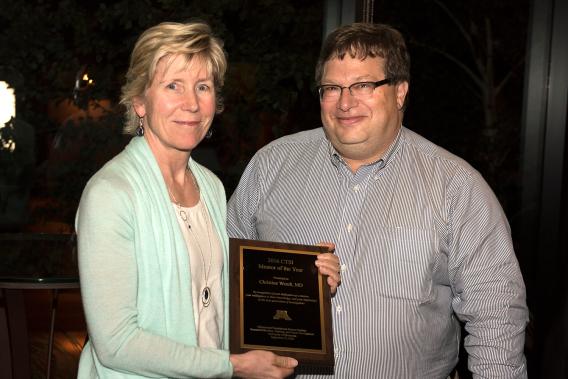
Focusing on career goals
CTSI mentors don’t just support trainees and junior faculty; they support individuals embarking on their first research experiences through CTSI’s summer research training programs for students.
For example, recent University of Minnesota Crookston graduate Sierra Trost – who was part of CTSI’s Pathways to Research Program (PReP) in 2016 – says her mentor is helping to reach her goal of becoming a doctor.
Sierra worked closely with CTSI mentor and School of Nursing Professor Joseph Gaugler, PhD, to conduct a research project, better understand potential career and educational paths, and sharpen skills that will serve her for years to come.
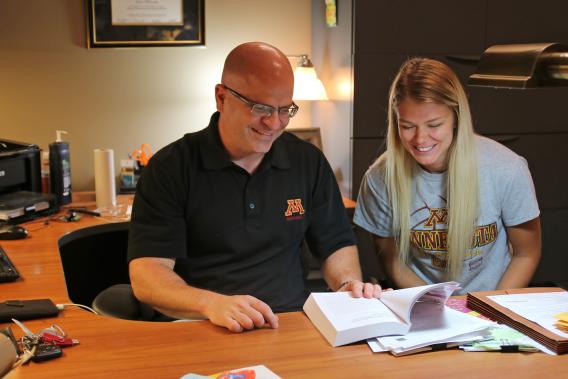
“My scientific and professional writing skills weren’t the strongest when I began, but under Dr. Gaugler’s guidance, my writing improved exponentially and I gained confidence along the way,” says Sierra, who currently has her first scientific manuscript under peer review.
Dr. Gaugler thought so highly of Sierra that he hired her as a paid research assistant during her gap year between undergraduate and medical school.
Dr. Gaugler offered constructive feedback to strengthen Sierra’s candidacy for medical schools, and now considers her to be “well-positioned” to obtain acceptance into medical school.
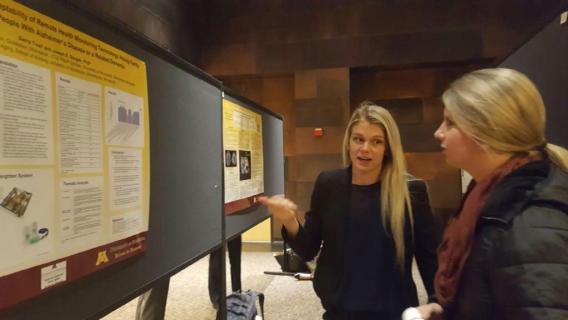
Establishing long-term relationships
Like Sierra and Dr. Pragman, University of Minnesota School of Nursing undergraduate student Jace Gilbertson’s relationship with his CTSI mentor continued even after concluding his CTSI program.
It began when CTSI matched Jace with Andrew Barnes, MD, MPH, an Assistant Professor with the Department of Pediatrics at the Medical School and a former CTSI KL2 scholar.
As part of his project for CTSI’s PReP program, Jace led a study of his choice and did all the groundwork, working closely with Dr. Barnes along the way.
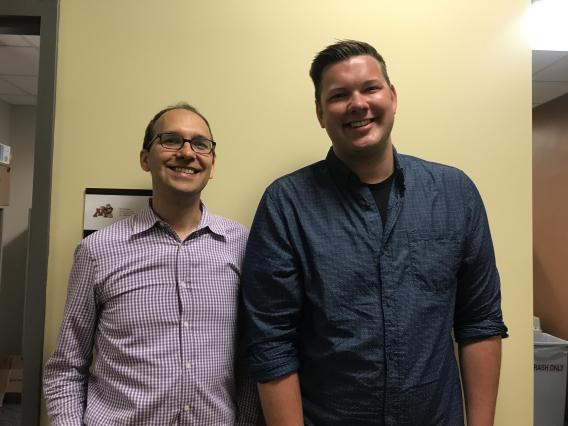
Creating experiential learning opportunities
Dr. Barnes also provided Jace with opportunities that went beyond his commitments as a CTSI mentor.
For example, Dr. Barnes arranged for Jace to shadow pediatric nurse practitioners (Jace’s desired profession) and gave Jace his first experience with research fieldwork at the University’s Driven to Discover Building at the Minnesota State Fair.
Research projects for scholars in CTSI’s student research training programs typically culminate at the annual CTSI Poster Session, but Jace’s didn’t stop there. Judges named his poster presentation the best of the PReP program, which netted him funding to present at a national conference.
This led Jace to become the only undergraduate student presenter at a recent conference for the National Association of Pediatric Nurse Practitioners. Prior to the conference, Dr. Barnes helped set Jace up for success by giving him feedback on his slides and even arranging a mock presentation so other pediatric researchers could give Jace feedback.
“Giving an oral presentation of my research at a national conference was the highlight of my college career,” says Jace, adding that the support of Dr. Barnes and CTSI helped make the experience possible.
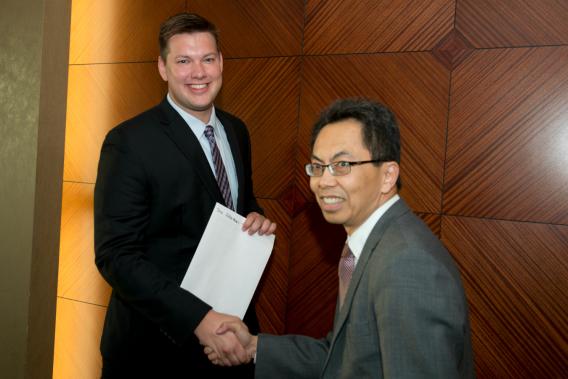
Cultivating our mentor pool
Through support from its National Institutes of Health Clinical and Translational Science Award, CTSI continues to develop an extensive roster of outstanding mentors — more than 150 across all six schools and colleges in the Academic Health Center, and beyond—with strong research and mentoring track records.
"CTSA support enabled us to establish an infrastructure for research mentorship that’s advancing the next generation of clinical and translational researchers," says Brooks Jackson, MD, MBA, Dean of the Medical School and Vice President for Health Sciences at the University. “Promising young researchers are receiving the dedicated mentorship they need to build successful research careers and make discoveries that could help people live longer, healthier lives.”
Peer research institutions also have taken note of the University’s approach to formalizing its research mentorship program, praising CTSI for its cadre of experienced, accomplished mentors encompassing a wide range of scientific disciplines.
CTSI encourages faculty interested in becoming research mentors to complete a brief interest form, and also offers an online module used nationally to train and prepare research mentors to effectively help advance the careers of their mentees. Curriculum was developed under the leadership of Anne Marie Weber-Main, PhD, from the University’s Medical School and Esam El-Fakahany, PhD, from the University’s College of Pharmacy.
“The long-term partnerships CTSI scholars develop with their mentors are one of the best testaments to the success of CTSI’s career development programs. Research is a long-term journey, so it’s critical that researchers take the trek with someone who’s committed to helping them flourish,” says Dr. Gaugler.
